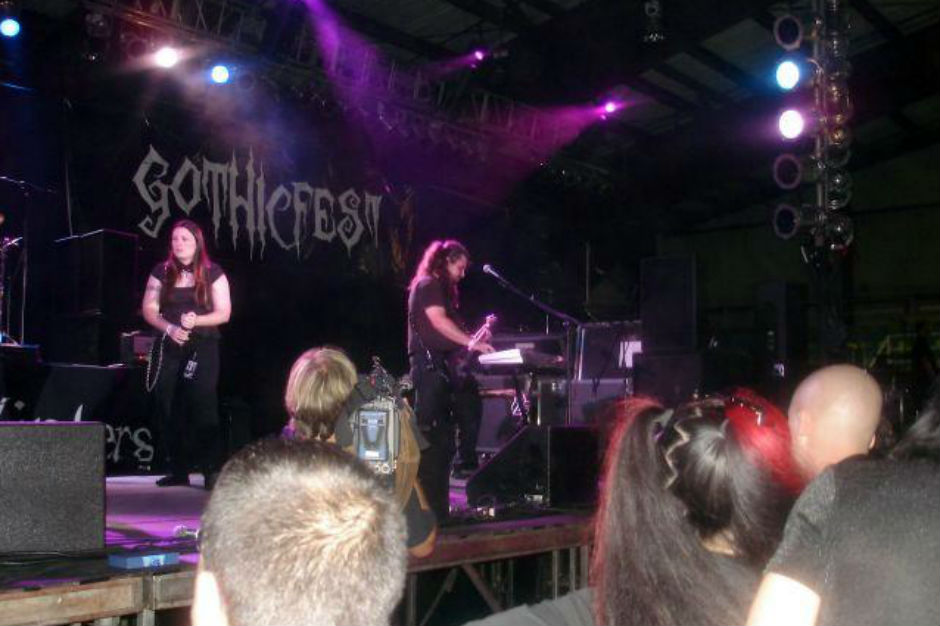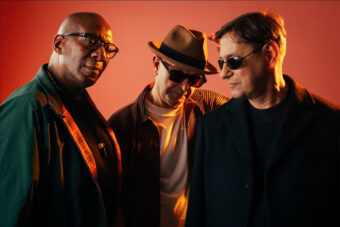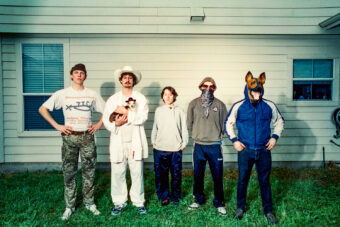Not to be too much of a kiss-ass brown-noser — God, those two phrases, especially when paired, reveal themselves to be rather vulgar — but I have really loved writing for SPIN. In life, I like to go on adventures and see what happens. If I can do this and combine it with journalism, then my work life and my life happily cross paths. Essentially, I get paid for being an idiot and reporting on it! This, naturally, is in opposition to just being an idiot and not getting paid, which is what usually happens.
Anyway, a few years ago, SPIN sent me to a goth music festival in Illinois. At the time, I knew nothing of goth music or the people who like it. One of my early literary heroes was Hunter S. Thompson, and so I always like to thrust myself into the story I’m covering. This gives me an excuse to behave poorly, like my idol Thompson, and to make that part of the narrative.
One of the benefits of covering the goth festival, in addition to meeting some very sweet people, was that it prepped me for my subsequent SPIN assignment, a profile of Marilyn Manson, with whom I definitely behaved poorly. I will say that I was a gentleman at the goth festival and didn’t get into trouble, but I’ll let you find out for yourself in the following pages as to whether or not this is true. — Jonathan Ames, as taken from SPIN Greatest Hits: 25 Years of Heretics, Heroes, and the New Rock’n’Roll
[This story was originally published in the April 2006 issue of SPIN. In honor of SPIN’s 30th anniversary, we’ve republished this piece as part of our ongoing “30 Years, 30 Stories” series.]

Also Read
THE DAY THE MUSIC DIED
I’m 41 years old and outwardly I may be one of the least goth people you could ever meet. For more than a decade, my style, fashion-wise, has been faux-preppy English professor, which means I wear sport coats and corduroy pants. To add a touch of flair, and to hide my bald head, I wear a tan cap backward, such that it looks like a beret. My musical taste, I should tell you, is similar to my clothing, which is to say it is decidedly non-goth. Twenty years ago, in college, I listened primarily to Cat Stevens, James Taylor, and Simon & Garfunkel; recently I’ve discovered Radiohead and find them to be quite good. So, clearly, I’m some kind of musical retard. Thus, SPIN, being rather mischievous, thought I’d be the perfect person to cover Gothicfest 2005, which was the first of its kind, just as there was a first Super Bowl or world war. It was an all-day gathering of 20 goth bands in Villa Park, Illinois, a distant suburb of Chicago. The following is a diary of my adventures amid these dark minstrels and their loyal brood.
Saturday, September 17, 2005
The Odeum Sports & Expo Center
12:25 p.m. I’m wearing my checked sport coat, white shirt, tan cap, and jeans (to help me fit in a little), but already seem to be attracting stares. There are roughly 100 people mingling about, and the Halloween-ish costumes are causing a knee-jerk terror response in me. There’s also pounding, scary music being played by a DJ.
I may have subconsciously chosen a white shirt to be defiant — everyone else is, of course, in black — and I just fantasized about being beaten to death as an intruder, getting kicked repeatedly while lying on the ground. A few of the fellows here look like neo-Nazi skinheads, which, I think, provoked this beating-to-death fantasy; also, I’m a little depressed and that always brings on suicidal thoughts.
Two chubby, expressionless boys stand to my right. They were once cute children, but now I imagine that they spend hours in dark bedrooms looking at violent porn. Or perhaps they have tender reveries about being sweet to the girls that they adore from a distance. I’d like to think about them in this generous light — that they are actually gentle young men — but it’s hard not to stereotype them as potential serial killers. It’s their eerie, still blankness that makes me think they’re capable of murder — and the fact that I’m in the Midwest. The Midwest seems to cultivate serial killing. Must be the boxed-in geography.
One wears glasses and has multipierced ears and a scruffy pubescent beard. His hair is dyed red and spiked up. His dirty, loose jeans flow to the floor over his shoes.
His friend has a more mature beard but is fatter, shorter, and his nose is swollen with oil and clogged pores. His eyes are slits. He wears a winter hat, a dirty T-shirt, and filthy jeans. He really could be a medieval Visigoth; I can imagine him swinging an ax with vigor. I do like that these two are standing next to each other, that they are friends and are here together. It makes me think of my childhood best friend, whom I hadn’t seen for years, and then learned two years ago that he had died. I miss him. In fact, I dreamed about him last night. Every few months I dream that we’re friends again.
1:15 p.m. I’m in a side room reserved for bands, talking to the ceremonial host and hostess of Gothicfest, Mark and Michelle.
Mark, 19, is wispy, with large, vulnerable eyes and dark hair draped across his forehead. He wears a black shirt, a velvet scarf, and saddle shoes. His black jeans are decorated with the lyrics from a song he wrote, “Crimson Tears of Tragedy.”
Michelle, 35, is short, pale, and voluptuous. She’s got on a black satin ball gown made in Germany from a 16th-century design, bejeweled gloves, platform boots, and an elaborate dreadlocked hairpiece.
“What do you get out of the goth scene?” I ask.
“The beauty of it,” says Michelle. “The elegance. The history. There’s so much conformity. We’re nonconformists. We don’t judge and we don’t want to be judged. We’re just artists expressing ourselves. I’m into traditional goth: Bauhaus and Joy Division. I hold true to the people who started the movement. My look is more classic, elegant, but some days I can go cyber.”
“I fall more into the glam-goth scene,” says Mark. “My idols were, like, David Bowie.”
“What do your families think about you being goths?” I inquire.
“My mother loved the scene,” says Michelle. “Like Peter Murphy. My father is totally sympathetic. Even when I was younger, into punk, he said, ‘I will never have a square daughter.'”
“I live with my grandparents,” Mark says. “My grandfather loves me for what I do — that I express myself. But my grandmother throws temper tantrums, calls me a fag because I wear makeup and I’m very feminine. I have an abusive relationship with my father. Constant beatings. I saw him in July, and he beat the shit out of me.”
“Did you fight back?” I ask.
“I don’t fight back,” Mark says. “As much as I don’t like him, I love him because he’s my father. So I just take it. He wants me to be more of a man, not so fem. He wants me to be tougher, cold, heartless, an alpha male.” Later, Mark tells us how his uncle, a goth who had drug problems but was a true father to him, committed suicide by slashing himself. Mark found him as he was bleeding to death. Mark starts crying and Michelle and I try to comfort him.
“I’m sorry I’m crying,” he says.
“It’s all right,” I say.
2:20 p.m. A band called Drake is playing.
The lead singer wears a long robe. He chants into the microphone in an ominous, froggy voice: “Dost thou leave me with such a myth / Falling into the abyss.” I admire his rhyme scheme, but it would be much better if he had a lisp — “the abyth.”
I eyeball the young man next to me, who is thin, brown-haired, and not very goth, except for his arms, which are encased in black fishnet stockings.
“Excuse me, could I interview you?” I ask.
“Sure,” he says. “They call me Rain.”
“Who’s they?”
“The people at my college. I used to have purple hair and they weren’t used to that there, so they called me Purple Rain, and it got shortened to Rain. My real name is Tim, but every Tim I know is a Melvin — an idiot — so I kept Rain.”
“Are you still in college?”
“No, I’m 30.”
“What’s your take on Gothicfest?” I ask.
“Well, I’m here for the headliner, Hanzel und Gretyl. I’m actually more into industrial. Most of the bands here today are industrial. Goth is dying. The scene is, like, 20 years old. It should die. It’s all regurgitating what was done in Germany ten, 12 years ago. Goth now is more about the clothing than the music. You can buy goth stuff at Hot Topic in the malls. Goth is dead in my world because it’s packaged. It’s not counterculture; it’s pop culture… Have you read Chomsky?”
“Not really,” I say, embarrassed, and then add weakly, “I have a sense, though, of what Chomsky is about.”
“A lot of the political message of industrial is voicing what Chomsky says — that we live in a benevolent fascist state.”
“I really need to read Chomsky,” I say. “Immediately.”
“You should see this documentary about him, Manufacturing Consent.”
“Thanks for the tip,” I say, and I sheepishly take my leave. I wasn’t expecting to meet a Noam Chomsky fan at Gothicfest.
3:10 p.m. A band with female members, Ghost Orgy, is onstage. They have a lovely, femme fatale-ish violinist and a busty lead singer in high black boots. There are about 400 people here now, sporting a number of interesting T-shirt slogans: EAT A BAG OF S**T; F**K YOU, YOU F**KING F**K; and AN EXPERIMENT IN SICKNESS. A girl walks past me with a backpack shaped like a coffin.
The singer suddenly lifts up her skirt, revealing black panties. At that moment it hits me: I need to interview this young lady.
3:40 p.m. I’m sitting with Ghost Orgy’s Dina Concina, who is in her mid-20s and even more beautiful up close. I compliment her on her performance, discreetly omitting the lifting-of-the-skirt part. She says she started her music career as a rock’n’roll singer but that she’s been into goth for the last three years.
“I realized how much hate I have inside,” she says, explaining her transition. “And I get to channel it onstage.”
“What do you hate?” I ask.
“Our corporate jobs, shit like that. People. Our lives.”
“Why do you hate your life?”
“Because I work a corporate job. Well, I just quit. But I was an engineer scientist for Kraft Foods.”
“What’s an engineer scientist do?”
“I created the recipes for cookies and crackers. I launched the new Cheese Nips. They’re f**king good. You should try them.”
“What do your parents think about you being in a goth band?”
“They don’t even know the name of my band. They would kill me. They’re old-school Filipino parents. But they’re awesome. They know I’m in a band, but they don’t know that I’m singing about death and demons and blood.”
“They don’t subscribe to SPIN, do they?”
She smiles, and then tells me that her neck is very stiff — she wrenched it onstage.
“I could give you a neck rub,” I say, and I can’t believe these words have come out of my mouth. It’s like I have Tourette’s. There’s nothing more pathetic than a man who offers a beautiful young woman a massage.
“That would be great,” she says.
First a Chomsky fan and now a young woman who will let me touch her! This Gothicfest is remarkable. I stand behind her and knead her neck. I feel like a dirty old man, and then I remember, I am a dirty old man.
4:10 p.m. I’m in the bleachers with Steve Watson and his 12-year-old daughter, Bethany, who are finishing up some hot dogs. Steve, 53, is friendly and articulate. He’s wearing khaki pants and a golf shirt. Bethany is frail and cute, with black lipstick, a retainer on her teeth, and a tiara on her dark hair. “Bethany is into all kinds of music,” Steve says. “Punk. Metal. And, quite frankly, I enjoy it as well. Living where we live, we’re not exposed to all this.” He waves his hand in front of him.
“You’re a very open-minded parent,” I say.
“I try to be. The community where we live is very affluent, and the people there are very intolerant. Not only are they intolerant of other people racially and financially, but if you don’t fit in to the WASP lifestyle, you’re shunned. Luckily for me, I have sufficient income so that I can say, ‘F**k you.'”
“Why do you live there?”
“Economic advantages. Schools are very good. Crime is zero. But it’s not a Utopia. Everybody is forced into conformity, and it puts the kids under a lot of stress. Bethany had some friends who wanted to come today, but their parents wouldn’t let them. I tell you, we’re treated more openly and accepting at these concerts than in our own community.”
Bethany tells me she had a band but that they split up. Their name was Toxic Popsicle.
“Not your average prom queen,” Steve tells me. “But I’m cool with it.”
7:15 p.m. I pass the booth selling skulls. They are very realistic-looking and can be used as piggy banks and candleholders. The short, smiling proprietress says, “Everybody likes a little head.”
“What did you say?” I ask. The music is very loud.
“Everybody likes a little head.”
“What?”
“Everybody likes a little head.”
A male cohort tries to explain her sense of humor: “We usually work biker shows.”
I move to the next stall, which is selling gigantic swords. I ask the woman standing behind a glass case of knives, “You can sell this stuff to someone right now?”
“No,” she says. “At the end of the concert, they can get it, and then they’re escorted out by security.”
“That’s good to know.”
12:00 a.m. I’m exhausted. I’ve been listening to goth music for almost 12 hours. The last band is on, but I can’t take much more. There are about 600 people here now — Gothicfest isn’t a mad success, but it’s not a failure, either. It’s been a good day for the goths. A pretty girl gyrating next to me shouts over the music, “Dance with me!”
“I’m too old,” I say.
“No, you’re not,” she says.
“How old are you?” I ask. She looks about 19, 20.
“Fifteen,” she says.
“Have a good time,” I say and quickly head for the exit.
On my way out, I pass a fellow with spikes poking out of the top of his shaved head. It’s like there are miniature traffic cones dividing his cranium in half.
“Are those spikes screwed into your skull?” I ask incredulously.
He puts his hand in his pocket, takes out a small bottle of glue, and says, “I’m not dumb, you know.”
I nod and leave. Outside, there’s a large, jaundiced moon in the black sky. I hope it’s still there when the goths come out. I feel like a parent whose children prefer to stay inside and watch TV. The father pleads, “It’s a beautiful day. Why don’t you go play outside?” In this case, I feel like pleading, “It’s a completely spooky night. Forget the loud music, come outside and have a blood sacrifice or something! There’s a full moon!” But I don’t say anything to anyone. I bid a silent farewell to the expo center, and with the moon watching over me, I get the hell out of there.




